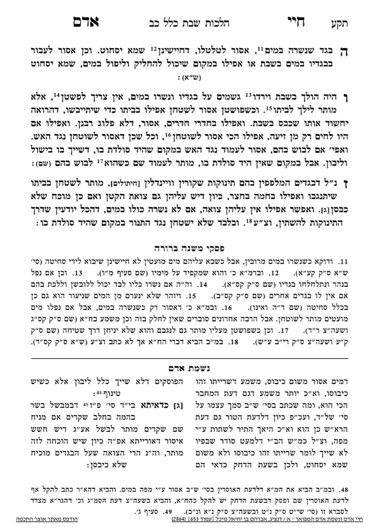We are beginning siman 5. The Chayei Adam writes that the concern that a person will squeeze a wet garment is so strong that Chazal even prohibit moving the garment. Similarly, one is not allowed to walk through water while wearing garments because one may squeeze the water out afterwards. Furthermore, it is even assur to walk on the banks of a river out of concern that a person will slip and fall into the water, and then do sechita on their clothing.
The Piskei Mishnah Berurah points out from the Rema that if a person does not mind that the clothing get wet, the gezeira does not apply.
The Chayei Adam clarifies that even though wet clothing are muktzah, if a person is walking in the rain or slips in a puddle, they do not have to remove their clothing. However, they cannot shake out the clothing. Once a person gets home, they should not hang it to dry, out of concern of maris ayin that people will think it was washed on Shabbos. Additionally, seeing that the rule of maris ayin is that once something is assur in public, it is assur in private as well, it would be assur to hang these wet clothing even in the privacy of one’s home.
The poskim assume that if the garment is a garment which is normally dry cleaned, it is muttar to hang it at home. Since it is not normally hand dried, people will not suspect the person washed it at home, but rather that it got wet. If it is a garment which could be washed at home, this gezeira would apply.
It is even assur to hang garments which are wet due to perspiration, as a person who sees them hanging cannot differentiate between a garment which is wet as a result of water versus a garment wet as a result of perspiration.
It is assur to hang the garment near a fire, and if one is still wearing the clothing, it would be assur to stand close enough to the fire that the clothing and water reach yad slides bo. This last point is assur both because of bishul and because of the libun that will occur as the water vaporizes and leaves the garment.
One can stand far enough away such that the clothing and water do not reach yad soledes bo. However, this only applies to clothing currently being worn, as the clothing which are being hung up are anyways assur to leave near a fire due to the concern of maris ayin.
Summary
- Out of concern for sechita, Chazal made a wet garment muktzah. This gezeira does not apply to garment which a person does not mind getting wet. It also does not apply to clothing a person is currently wearing.
- If a person’s clothing get wet and they remove them, a few halachos
- They cannot hang them to dry, even in private,
- and cannot shake out the water. This gezeira does not apply to clothing which are not normally cleaned at home.
- Out of concern for sechita, Chazal prohibit walking on a riverbank.
- The above concerns apply equally to a garment which got wet from water or from perspiration.
- If one is still wearing the wet clothing, they can stand near a fire but he cannot be close enough that the clothing and water reach yad soledes bo.



